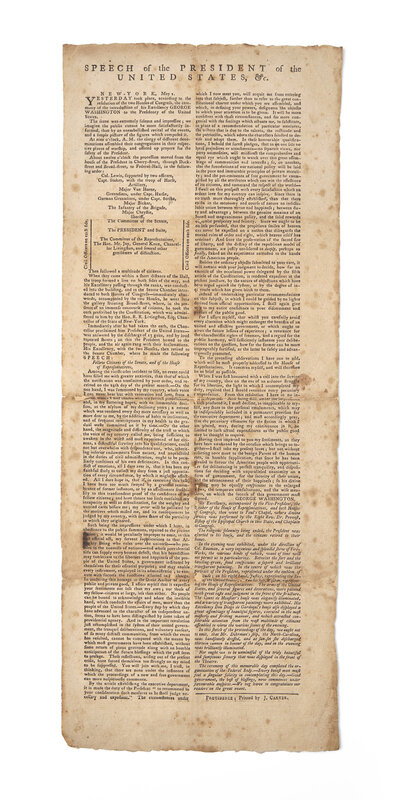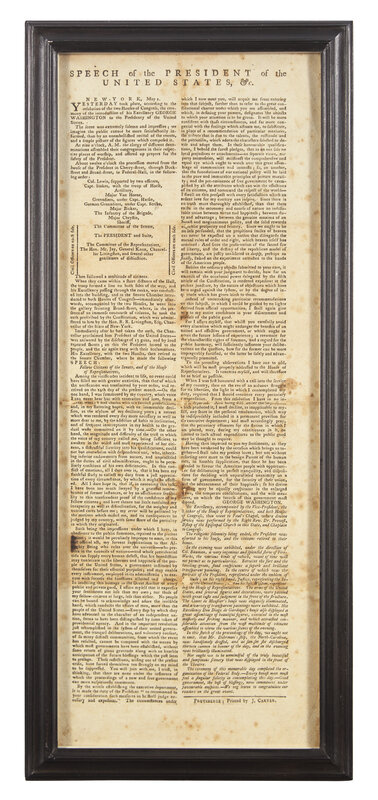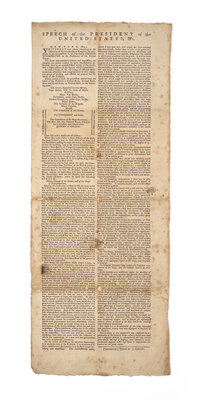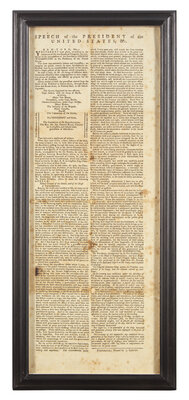Condition Report
Contact Information
Auction Specialist
Lot 56
[Washington, George] Printed Broadside of Washington's First Inaugural Speech
Sale 6308 - Printed and Manuscript Americana
Jan 29, 2025
10:00AM ET
Live / Philadelphia
Own a similar item?
Estimate
$15,000 -
25,000
Price Realized
$381,500
Sold prices are inclusive of Buyer’s Premium
Lot Description
[Washington, George] Printed Broadside of Washington's First Inaugural Speech
Extraordinarily Rare Broadside Printing of George Washington's First Inaugural Address, The Only Known Copy in Private Hands
"The preservation of the sacred fire of liberty, and the destiny of the republican model of government, are justly considered as deeply, perhaps as finally, staked on the experiment entrusted to the hands of the American people."
Providence: J(ohn). Carter, ca. May 16, 1789. Broadside, printed in two columns: "Speech of the President of the United States, &c." Creasing from old folds, professional repairs along same on verso, with some scattered very small repaired losses, affecting some text; scattered spotting. 18 1/16 x 7 in. (459 x 178 mm). Not in Evans, Alden, Winship, Sabin, Bristol, Shipton & Mooney, or ESTC
The first electoral college met on February 4, 1789 and unanimously elected George Washington as the first President of the United States. On April 16, Washington departed his Mount Vernon home for the then capital, New York City, to take office--an over week-long journey where he was met in every town with celebrations and cheering crowds. On the morning of April 30, Washington was sworn into office at Federal Hall, and after taking the oath, delivered his first Inaugural Address to the members of the Senate and House of Representatives, within the Senate chamber. While the Constitution did not require him to give a speech, Washington was aware of the magnitude of the moment for the new government, and took the opportunity to offer a guiding message at the beginning of this new chapter.
Despite his own misgivings about becoming chief executive, Washington began composing a speech as early as January 1789, an indication that he understood the inevitability of his election. His first draft was written with the help of David Humphreys, and reached over a staggering 73-pages. James Madison, then acting as an intermediary between the executive and legislative branches, reviewed this draft for Washington, but dismissed it for being too long and too focused on legislative proposals. In its place, Madison helped Washington draft this much more concise speech, which instead focused on the political principles that Washington's precedent-setting tenure would help bring to life.
The speech was quickly and widely reprinted throughout the nation in the days and weeks that followed. It first appeared in newspapers in New York, the first on May 1 (New-York Daily Gazette, The New York Morning Post, and Daily Advertiser, and The New-York Packet), and on May 2 in the Gazette of the United States. From there it was reprinted throughout the country, such as in the Connecticut Journal and the Massachusetts Spy: Or, The Worcester Gazette on May 6, and in Boston's The Herald of Freedom and the Federal Advertiser on May 8.
John Carter, the Providence, Rhode Island, printer of this broadside, first published Washington's Address in the Saturday May 16 issue of his Providence Gazette and Country Journal. It is likely around this same time that he printed off copies of the above broadside. Born in Philadelphia, John Carter (1745-1814) apprenticed in the print shop of Benjamin Franklin and David Hall. In 1767, following the completion of his apprenticeship, Carter and his family moved to Providence, where he became a journeyman printer under William Goddard—Providence’s first printer—and then Sarah Updike Goddard (William's mother), publishers of the Providence Gazette. In 1768, at age 23, Sarah sold the paper to Carter, which he continued to publish up until his death. In 1772 he moved his printing operations to his newly built home “at the Sign of Shakespear’s Head”, which doubled as the town's post office and book store. That same year, Benjamin Franklin, then postmaster general, appointed Carter postmaster of Providence, a position he held until 1792. One of the most productive American printers of his time, Carter published more than 40 percent of all Rhode Island imprints, and in the process greatly shaped public opinion on matters regarding the Revolution and beyond. A fervent Patriot, he advocated for American liberty in his publications, and was later a strong supporter for the ratification of the Constitution. Along with this first inaugural address, Carter also printed the first copy of the Constitution in Rhode Island, as well as the Bill of Rights. His federalist beliefs ran counter to many in his home state, where the question of ratification was a bitter and protracted affair. Rhode Island did not ratify the new charter until May 1790, in the narrowest margin of any state, at 34-32 in favor.
While newspaper printings of Washington's Address are fairly common, broadside printings are significantly more rare, and seldom come to market or appear in institutional collections. This Providence printing is one of only two known surviving examples of it, the other located in The Henry Ford Museum (19 x 7 in.; 483 x 178 mm). Overall, we can locate only three other printings of this Address, all in institutional collections, and each as single examples. These include a printing attributed to Henry Barber of Newport, in three columns, at the Rhode Island Historical Society (13 1/2 x 8 in., 343 x 203 mm; Bristol B7202, Shipton & Mooney 45726, Alden 1188); one by C.R. & G. Webster of Albany, in three columns, at the Huntington Library (15 x 10 in., 381 x 254 mm; Evans 22212); one printed in New York (no publisher stated), in three columns, at the New-York Historical Society (14 x 8 in., 356 x 203 mm; Bristol B7203; Shipton & Mooney 45727). Another printing is listed in the 1902 catalogue of New York bookseller George D. Smith, and identified as a supplement to the Connecticut Gazette, printed in three columns (p. 116). We have not been able to locate an extant copy of this printing.
According to RBH, only one broadside example of Washington's Address has ever come to auction, also an example of this Providence printing, sold in 1917, at American Art Association. It was catalogued as "Very rare. No copy listed in book-prices current as sold in America."
This lot is located in Philadelphia.



